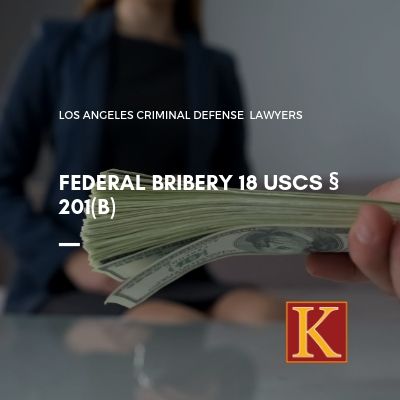Bribery is an act of offering giving, receiving, or soliciting something of value for the purpose of influencing the acts of a public official in discharge of his legal or public duties.
18 U.S.C. § 201(b)(1): Bribery of a Public Official
Defendant is guilty of bribing a public official in case he directly or indirectly gives or promises to give something of value to the public official with intention to corruptly influence the public official to omit or perform an official act in violation of the official’s public duty.
Corrupt action is any intentionally performed action with an illegal purpose.
Public official is any officer, agent or employee of the US or any agency, department, or branch of the federal government who is acting in an official capacity. For the purposes of this crime jurors sitting on a federal jury will also fall within the definition of the public official.
According to 18 U.S.C. § 201(a) official act is any action or decision that may be brought before a public official in his official capacity.
18 U.S.C. § 201(c)(1)(A): Illegal Gratuity to a Public Official
Defendant is guilty of providing illegal gratuity to a public official in case he directly or indirectly offers or gives something of value to a public official because of an official act performed by the public official.
For proving the violation the prosecutor must establish that there is a relationship between the “something of value” and the official act for which it was conferred.
18 U.S.C. § 215(a) (1): Bribery or Reward of a Bank Officer
Defendant is guilty of bribery of a bank officer in case he offers or gives something of value to a bank officer with intention of influencing the bank officer and in connection with a business transaction.
Bank officer is any director, agent, employee, or other office of a financial institution.
Legal defenses to federal bribery charges
- Lack of Evidence
For convicting the defendant the prosecution must prove beyond the reasonable doubt all elements of crime. In case there is a lack of evidence proving the defendant’s fault he can’t be found guilty of federal bribery.
- Lack of Intent
In federal bribery cases, the prosecutor must establish that the defendant had the criminal intent to commit the crime. One of the most difficult areas of the government’s case is proving intent, and if the defendant can present arguments and evidence to show that he did not possess the intent to commit the alleged criminal activity, he won’t be found guilty of this crime.
Penalties for Federal Bribery
Penalties for violating 18 U.S.C. § 201(b)(1)
- Up to fifteen years in federal prison
- A fine of up of an amount not more than three times the monetary equivalent of the thing of value offered to the public official.
Penalties for violating 18 U.S.C. § 201(c)(1)(A):
- Up to two years in federal prison and/or fines
Penalties for violating 18 U.S.C. §215(a) (1):
If the amount of the “something of value” offered or provided to the bank officer is more than $1000, the penalties are the following:
- Up to thirty years in federal prison
- Fines of up to $1,000,000 or three times the value given, whichever is greater.
If the amount of the “something of value” is less than $1,000, the defendant will receive up to one year in federal prison and fines.

